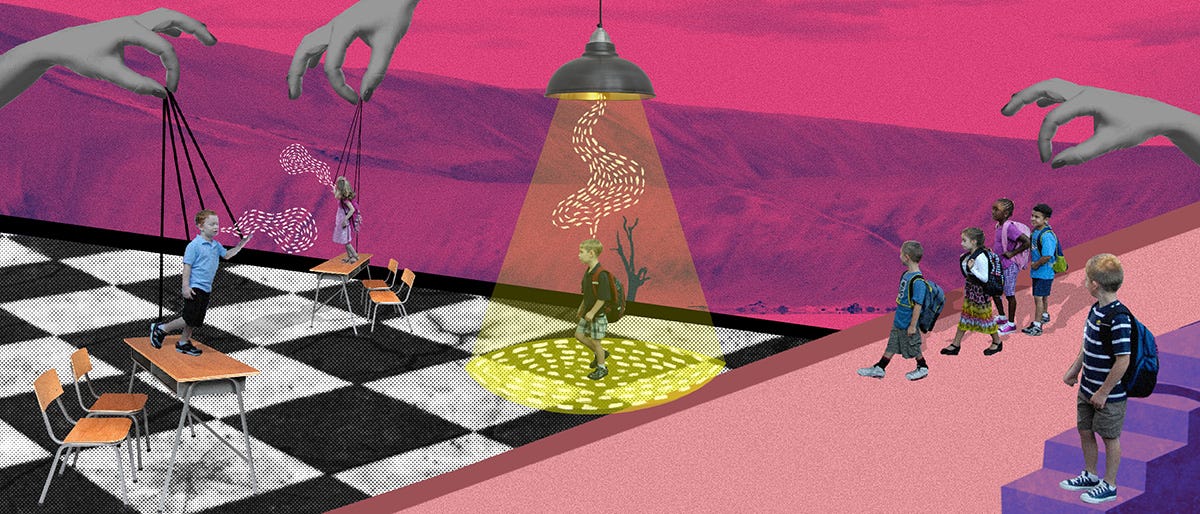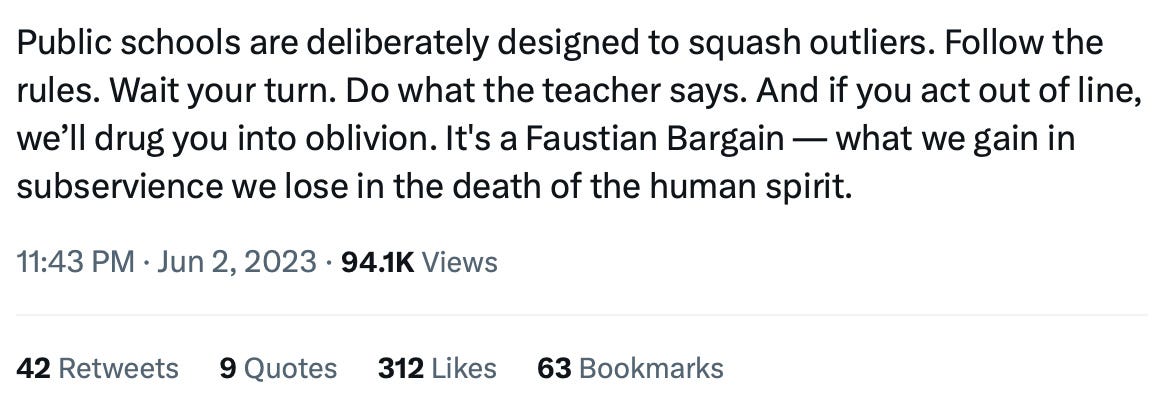The Point of School Is Learning to Pull One Over on Oppressive Institutions

There’s a particular critique of K–12 school that’s popular in the tech and internet creator worlds. Every few months I see a new version of it making the rounds on Twitter or Substack, always bedazzled in approving comments. The specific language varies, but the general arc is the same: the way we educate children is an archaic holdover from the agrarian days that’s less about teaching kids to learn or create than it is about training them to be docile, obedient conformists.
Steve Jobs and Elon Musk both said versions of this, as have legions of their lesser imitators—here’s the version I’ve seen going around most recently. (I’ve hidden the author’s name because I don’t mean to rag on him specifically; this is just a representative example.)
There was a time when I would’ve unthinkingly nodded my head at this critique. But the more I consider it, the more I think it’s mostly bullshit, the kind of argument that sounds good—and makes its author seem smart—but falls apart when you look at it closely.
Obviously, I’m not saying school in America is perfect—I’m not even saying that it’s necessarily good. There are lots of problems with our educational system. But the idea that it’s turning generations of curious, creative kids into a bunch of dead-eyed, rule-following adults is a simplistic fantasy.
Most people aren’t actually that creative, and it isn’t school’s fault
Ever since the scribes and editors whose names have been lost to history wrote Genesis1, people have yearned for stories in which their fall from a better, purer state can be blamed on someone else. It’s comforting to think we could be living in a utopia of independent creativity, if only our education system didn’t beat it out of everyone.
But the truth is, most people just aren’t that independent, creative, or free-thinking in the first place. In the immortal words of Don Draper, “People want to be told what to do so badly that they’ll listen to anyone.” It’s easier to blame school, or some other external force, than to accept that unpleasant fact2.
“Creativity” is a pretty loosely-defined concept, but it doesn’t seem like societies with less education have more of it, nor does it seem like people in the U.S. were more creative before public education became widespread in the 20th century. And as far as I can tell, there’s also no clear link between education rates and how conformist or collectivist a society is. Besides, this argument vastly overstates the power of most schools. I find it hard to believe that we can’t reliably teach math, but can somehow stamp out the creativity of an entire generation.
Granted, the average adult really is less free-spirited and creative than the average kid, so there’s certainly something causing the change. But I strongly suspect that the culprit is mostly biology, perhaps with some side blame placed, angsty teen style, on society as a whole. My friends’ two-year-old puts almost everything he can find in his mouth, which is a pretty free-spirited and exploratory way to approach the world. I’m pretty sure the reason I don’t isn’t because school taught me not to.
It’s the children who are wrong
There is one element of most schools that is genuinely oppressive, one that pushes students to conform to others’ expectations and to follow a strict set of (usually implicit) behavioral rules. But this element isn’t the teachers, administrators, or curriculum—it’s the other kids.
Students can enforce conformity in ways that the formal educational institution can only dream of. Unlike teachers, they’re not constrained by the need to actually teach stuff or the desire not to get fired. And most people inherently yearn to fit in with their peers far more than they yearn to follow their teachers’ instructions. Some amount of viciousness is, I think, inherent in being young—even the good kids can be casually, almost incidentally cruel to each other in ways that would make Ms. Trunchbull blush.
Not that this usually happens through the kind of bullying you’d see in a John Hughes movie. We seek our peers’ approval, and in doing so we quietly conform ourselves to the prevailing social norms. That—way more than teachers telling us to stay in line—is how school quashes outliers.
But I don’t think it’s really fair to pin the blame for this on school specifically. We’d see the same process unfold in any institution we filled with teenagers.
I went to this lousy school and all I learned was how to thrive within an oppressive institution
Let’s for a moment grant that school actually is a somewhat oppressive environment—that it does, in the words of the tweet that inspired this essay, try to get you to “follow the rules, wait your turn, and do what the teacher says.” This wouldn’t necessarily be a bad thing. A light degree of institutional tyranny can be an essential part of the educational process.
Throughout our lives, we will be part of many oppressive institutions, because institutions are fundamental to modern life, and all institutions are at least a little bit oppressive. “Oppressiveness” is a loaded word, but I don’t necessarily mean it in a bad way. It’s just that the function of institutions is to mediate and standardize behavior at scale, and that necessarily involves individuals giving up some degree of personal freedom. Sure, some institutions (the family, good workplaces) are less oppressive than others (the legal system, bad workplaces), but no matter what, being part of one involves tradeoffs.
Learning how to pull one over on these institutions—or, to put it more gently, how to navigate those tradeoffs, and how to participate in institutions without completely sublimating your individuality—is an essential life skill, and school is one of the first places you learn it.
Elements of this skill include:
Learning when to work hard and when to work not so hard
Understanding which rules are actually mandatory and which are presented as mandatory but maybe aren’t
Understanding how power within an institution really works, vs. how its stated rules and hierarchies would have you believe it works
Understanding how to get things done by appealing to individuals’ personal incentives, not just by following formal policies
Deciding for yourself which rules you actually want to follow, and which consequences you’re willing to accept
Yes, schools only teach this implicitly, and some people probably miss the lesson. But it’s the kind of lesson that can only be taught implicitly. Like the Matrix, no one can be told what it is—you have to see it for yourself.
We don’t have our spirit crushed. Only the little people have their spirit crushed.
Artists as different as Igor Stravinsky, Jackson Pollock, and Dr. Seuss will tell you that creativity thrives under constraints. If an institution as tame as America’s K–12 schools can crush your independent spirit or creative spark completely, maybe you weren’t actually all that independent or creative to begin with. After all, plenty of people have become black-market entrepreneurs in prison or written poetry in the Gulag.
But is this spirit-crushing actually even happening? I find it highly suspicious that I never hear anyone complain that school destroyed their creativity—this process is always something that happens to other people. The people making this case are demonstrating the very independence they claim school suppresses. They’re also subtly reminding us that they, of course, made it through the system with their indefatigable creative spirit alive and well.
I’m not saying that the people who make these arguments are just humblebragging. But I do think they’d be well-served by outlining more of a theory for why they and they alone were immune from the subservience they claim school engenders. Maybe, just maybe, schools in America are a lot like most other giant institutions: muddling through as best they can, with some positive effects and some negative ones, and not nearly as powerful as their critics make them out to be.
Conform to the oppressive institution that is this newsletter by hitting that ♡ button below—it helps more people discover my writing on Substack.
Or Moses, if that’s more your thing.
This line of thinking reminds me of many liberals’ current obsession with “misinformation.” Much easier to pretend that everyone would agree with us if only they had the right information rather than accepting that many people genuinely hold different (and sometimes abhorrent) beliefs.



